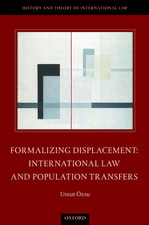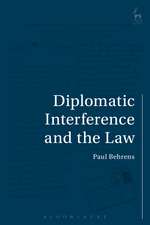Complicity in International Criminal Law: Studies in International Law
Autor Marina Aksenovaen Limba Engleză Paperback – 29 mai 2019
Toate formatele și edițiile
| Toate formatele și edițiile | Preț | Express |
|---|---|---|
| Paperback (1) | 226.87 lei 6-8 săpt. | |
| Bloomsbury Publishing – 29 mai 2019 | 226.87 lei 6-8 săpt. | |
| Hardback (1) | 513.60 lei 6-8 săpt. | |
| Bloomsbury Publishing – 14 dec 2016 | 513.60 lei 6-8 săpt. |
Din seria Studies in International Law
- 34%
 Preț: 511.07 lei
Preț: 511.07 lei - 30%
 Preț: 538.77 lei
Preț: 538.77 lei - 23%
 Preț: 249.26 lei
Preț: 249.26 lei - 34%
 Preț: 512.30 lei
Preț: 512.30 lei - 21%
 Preț: 275.26 lei
Preț: 275.26 lei - 30%
 Preț: 570.51 lei
Preț: 570.51 lei - 30%
 Preț: 571.24 lei
Preț: 571.24 lei - 30%
 Preț: 598.45 lei
Preț: 598.45 lei - 18%
 Preț: 297.20 lei
Preț: 297.20 lei - 30%
 Preț: 573.05 lei
Preț: 573.05 lei - 30%
 Preț: 1138.79 lei
Preț: 1138.79 lei -
 Preț: 448.39 lei
Preț: 448.39 lei - 30%
 Preț: 571.34 lei
Preț: 571.34 lei - 28%
 Preț: 406.31 lei
Preț: 406.31 lei - 21%
 Preț: 270.97 lei
Preț: 270.97 lei - 30%
 Preț: 570.43 lei
Preț: 570.43 lei - 30%
 Preț: 836.82 lei
Preț: 836.82 lei - 14%
 Preț: 570.43 lei
Preț: 570.43 lei - 30%
 Preț: 512.37 lei
Preț: 512.37 lei - 30%
 Preț: 511.14 lei
Preț: 511.14 lei - 30%
 Preț: 954.11 lei
Preț: 954.11 lei - 30%
 Preț: 572.47 lei
Preț: 572.47 lei - 30%
 Preț: 603.73 lei
Preț: 603.73 lei - 30%
 Preț: 779.50 lei
Preț: 779.50 lei - 14%
 Preț: 837.54 lei
Preț: 837.54 lei - 30%
 Preț: 898.78 lei
Preț: 898.78 lei - 30%
 Preț: 576.40 lei
Preț: 576.40 lei - 30%
 Preț: 719.91 lei
Preț: 719.91 lei - 30%
 Preț: 599.66 lei
Preț: 599.66 lei - 12%
 Preț: 233.46 lei
Preț: 233.46 lei - 30%
 Preț: 779.50 lei
Preț: 779.50 lei - 30%
 Preț: 570.43 lei
Preț: 570.43 lei - 14%
 Preț: 779.09 lei
Preț: 779.09 lei - 30%
 Preț: 540.38 lei
Preț: 540.38 lei - 30%
 Preț: 573.86 lei
Preț: 573.86 lei - 14%
 Preț: 574.92 lei
Preț: 574.92 lei - 28%
 Preț: 500.25 lei
Preț: 500.25 lei - 30%
 Preț: 542.02 lei
Preț: 542.02 lei - 30%
 Preț: 778.12 lei
Preț: 778.12 lei - 30%
 Preț: 540.48 lei
Preț: 540.48 lei - 30%
 Preț: 570.43 lei
Preț: 570.43 lei - 30%
 Preț: 515.24 lei
Preț: 515.24 lei - 30%
 Preț: 573.70 lei
Preț: 573.70 lei - 30%
 Preț: 720.23 lei
Preț: 720.23 lei - 30%
 Preț: 784.00 lei
Preț: 784.00 lei - 22%
 Preț: 571.24 lei
Preț: 571.24 lei - 14%
 Preț: 779.09 lei
Preț: 779.09 lei - 30%
 Preț: 779.91 lei
Preț: 779.91 lei
Preț: 226.87 lei
Preț vechi: 290.00 lei
-22% Nou
Puncte Express: 340
Preț estimativ în valută:
43.41€ • 45.33$ • 35.85£
43.41€ • 45.33$ • 35.85£
Carte tipărită la comandă
Livrare economică 15-29 aprilie
Preluare comenzi: 021 569.72.76
Specificații
ISBN-13: 9781509928903
ISBN-10: 1509928901
Pagini: 344
Dimensiuni: 156 x 234 x 18 mm
Greutate: 0.48 kg
Editura: Bloomsbury Publishing
Colecția Hart Publishing
Seria Studies in International Law
Locul publicării:London, United Kingdom
ISBN-10: 1509928901
Pagini: 344
Dimensiuni: 156 x 234 x 18 mm
Greutate: 0.48 kg
Editura: Bloomsbury Publishing
Colecția Hart Publishing
Seria Studies in International Law
Locul publicării:London, United Kingdom
Caracteristici
Will appeal to both academics and practitioners in the field of international criminal law.
Notă biografică
Marina Aksenova is Postdoctoral research fellow at iCourts, Centre for Excellence for International Courts, University of Copenhagen.
Cuprins
1. Introduction 2. Origins of Complicity: The Domestic Law Intake Introduction I. The Comparative Method in International Criminal Law II. Complicity in Domestic Law III. Lessons Learned from Comparative Studies Conclusion 3. The Evolution of Complicity as a Construction for Dealing with Collective Criminality Introduction I. Conspiracy versus Complicity at Nuremberg and Tokyo II. Domestic Law versus International Law during the Subsequent Trials III. Defining the Contours of Complicity: The ILC's Contribution IV. Historical Trends 4. Complicity in the Jurisprudence of the Ad Hoc Tribunals and Hybrid Courts Introduction I. Forms of Participation in the Statutes of the Ad Hoc Tribunals and Hybrid Courts II. Problems with Building a Coherent Account of Complicity Conclusion 5. Complicity and the Hierarchy of the Participation Modes at the International Criminal Court Introduction I. Modes of Participation at the ICC II. Hierarchy of the Participation Modes Conclusion 6. Complicity in International Criminal Law and Law of State Responsibility: A Comparative Analysis Introduction I. Complicity in the Law of State ResponsibilityII. Comparative Analysis of Complicity in International Criminal Law and the Law of State Responsibility III. Treatment of Complicity in Two Areas of Law: Common Trends and Divergences Conclusion 7. The Correlation between Complicity and Sentencing Introduction I. The Correlation between Complicity and Sentencing II. Sentencing Objectives at the Crossroads: Domestic and International Law III. Embracing Judicial Sentencing Discretion in International Criminal Law Conclusion 8. Conclusion: The Place of Complicity in International Criminal Law Introduction I. The Limitations of International Criminal Law II. Symbolism as an Overarching Aim III. Improving the Current Practices of Attaching Liability for Complicity


















